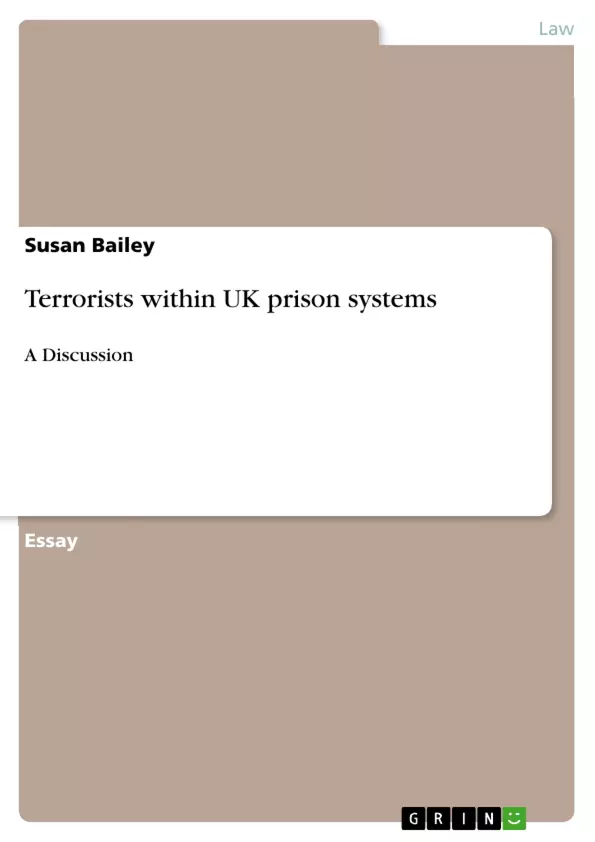This essay examines how the terrorist group ISIS are managed within UK prisons, paying particular focus to the issues around radicalisation within mainstream UK prisons.
Terrorists in prison is a highly emotive topic, often filled with myths and profound political controversy, alongside tales of abuse, negligence, risk and mismanagement. Crenshaw (1992) defined the term terrorism as a particular style of political violence, using a small number of victims to influence and scare a wider audience. As many different types of terrorist come under this umbrella, this essay will focus on one type of terrorist, the violent religious extremist group, Isis.
This essay will evaluate the statement, by abolitionists, that prisons are irrational and counterproductive in relation to terrorists. This will be done by firstly evaluating critical issues around management strategies, risk assessment and the reform of imprisoned terrorists. Also, the risk of further radicalisation and de radicalisation will be explored, emphasising on the risk of keeping such prisoners. This essay will then discuss whether these strategies are successful and if not, this essay will then examine if theories of punishment can be applied to the terrorist. Her Majesty’s Prison Service (HMPS) has aims that are crystallised in the HMPS statement ‘Her Majesty’s Prison Service serves the public by keeping in custody those committed by the courts, our duty is to look after them with humanity and help them lead law abiding and useful lives in custody after release. However, HMPS may be able to work towards keeping this promise in regard to other prisoners but, terrorism is different from other types of crime and many terrorists are violent extremists who cause formidable challenges. Their management can pose exceptionally difficult problems in the prison setting.
Inhaltsverzeichnis (Table of Contents)
- Introduction
- The Challenge of Managing Terrorist Prisoners
- The Rise of ISIS and its Impact on Counter Terrorism Strategies
- The Debate on Prison Abolitionism and its Relevance to Terrorist Prisoners
- Developing Strategies and Interventions to Manage Extremist Prisoners
- Rehabilitation Programmes and the Role of Cognitive Behavioural Therapy (CBT)
- The Challenges of Rehabilitating 'Irreconcilables' and the Importance of Risk Management
- The UK Prison System's Approach to Managing Terrorist Prisoners
- The Risk of Radicalisation and De-Radicalisation in Prison
- The Impact of Prison Culture on Radicalisation and Recruitment
- Conclusion
Zielsetzung und Themenschwerpunkte (Objectives and Key Themes)
This essay aims to evaluate the effectiveness of prison management strategies and rehabilitation programs in relation to terrorist prisoners. It examines the argument made by abolitionists that prisons are ineffective and counterproductive in addressing terrorism. This essay analyzes various aspects of prison management, including risk assessment, radicalization, and de-radicalization, while considering the ethical and legal implications of these strategies.
- The challenges of managing terrorist prisoners in a prison setting
- The effectiveness of rehabilitation programs in de-radicalizing extremist prisoners
- The role of prison culture and environment in fostering radicalization and recruitment
- The ethical and legal considerations surrounding the management of terrorist prisoners
- The potential risks of further radicalization and the need for effective counter-terrorism strategies
Zusammenfassung der Kapitel (Chapter Summaries)
- The essay introduces the topic of terrorist prisoners and the challenges they pose for prison management. It outlines the arguments made by abolitionists about the inefficacy of prisons.
- The essay explores the rise of ISIS and its impact on counter-terrorism strategies, highlighting the new challenges posed by the group's ideology and tactics.
- This section discusses the debate on prison abolitionism, examining the arguments for and against abolishing prisons as a means of dealing with crime and terrorism.
- The essay examines the development of strategies and interventions specifically designed to manage extremist prisoners within the UK prison system.
- The essay analyzes the role of cognitive behavioral therapy (CBT) and other rehabilitation programs in addressing the challenges of de-radicalization among terrorist prisoners.
- The essay discusses the difficulties of rehabilitating 'irreconcilables', who are deeply committed to extremist ideologies and may not be receptive to change. It also emphasizes the importance of risk management in dealing with such prisoners.
- The essay details the UK prison system's approach to managing terrorist prisoners, highlighting the unique methods employed in comparison to other countries.
- This section examines the risks of further radicalization within prisons, exploring the factors that contribute to this phenomenon.
- The essay explores the complex relationship between prison culture and radicalization and recruitment, considering the potential for prisons to act as breeding grounds for extremism.
Schlüsselwörter (Keywords)
This essay focuses on key concepts related to terrorism, prison management, rehabilitation, radicalization, and de-radicalization. It examines the challenges of managing extremist prisoners, the effectiveness of rehabilitation programs, and the potential risks of further radicalization within prison settings. Key themes include counter-terrorism strategies, prison abolitionism, cognitive behavioral therapy (CBT), risk assessment, and the impact of prison culture on extremist behavior.
Frequently Asked Questions
What is the main focus of this essay on UK prisons?
The essay examines the management of ISIS terrorists in UK prisons and the specific challenges of radicalization and de-radicalization.
What is the abolitionist perspective regarding terrorist prisoners?
Abolitionists argue that prisons are irrational and counterproductive, potentially acting as breeding grounds for further extremism rather than reform.
How does the UK prison system attempt to de-radicalize inmates?
The system employs specialized interventions and rehabilitation programs, including the use of Cognitive Behavioral Therapy (CBT).
What are "irreconcilables" in the context of terrorism?
Irreconcilables are individuals deeply committed to extremist ideologies who are resistant to rehabilitation, posing a high risk for prison management.
Does prison culture impact recruitment for terrorist groups?
Yes, the essay explores how prison environments can facilitate radicalization and recruitment through social dynamics and specific cultural factors.
- Quote paper
- Susan Bailey (Author), 2017, Terrorists within UK prison systems, Munich, GRIN Verlag, https://www.hausarbeiten.de/document/413245


